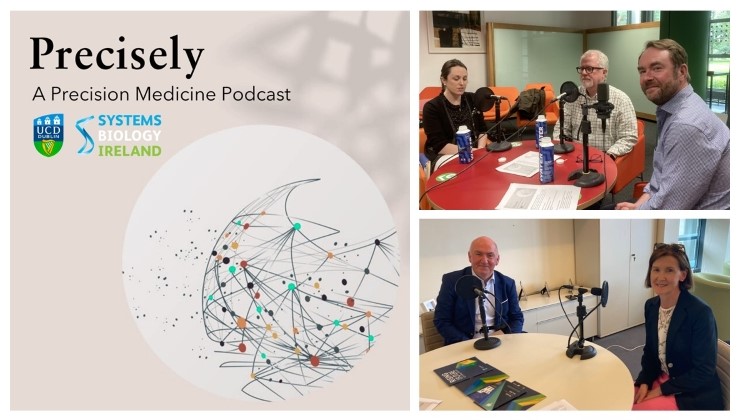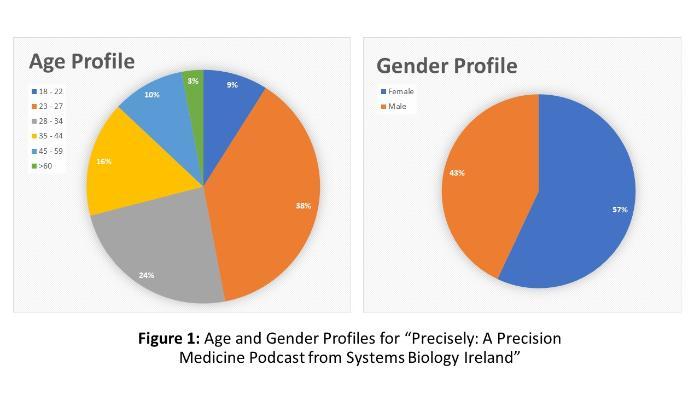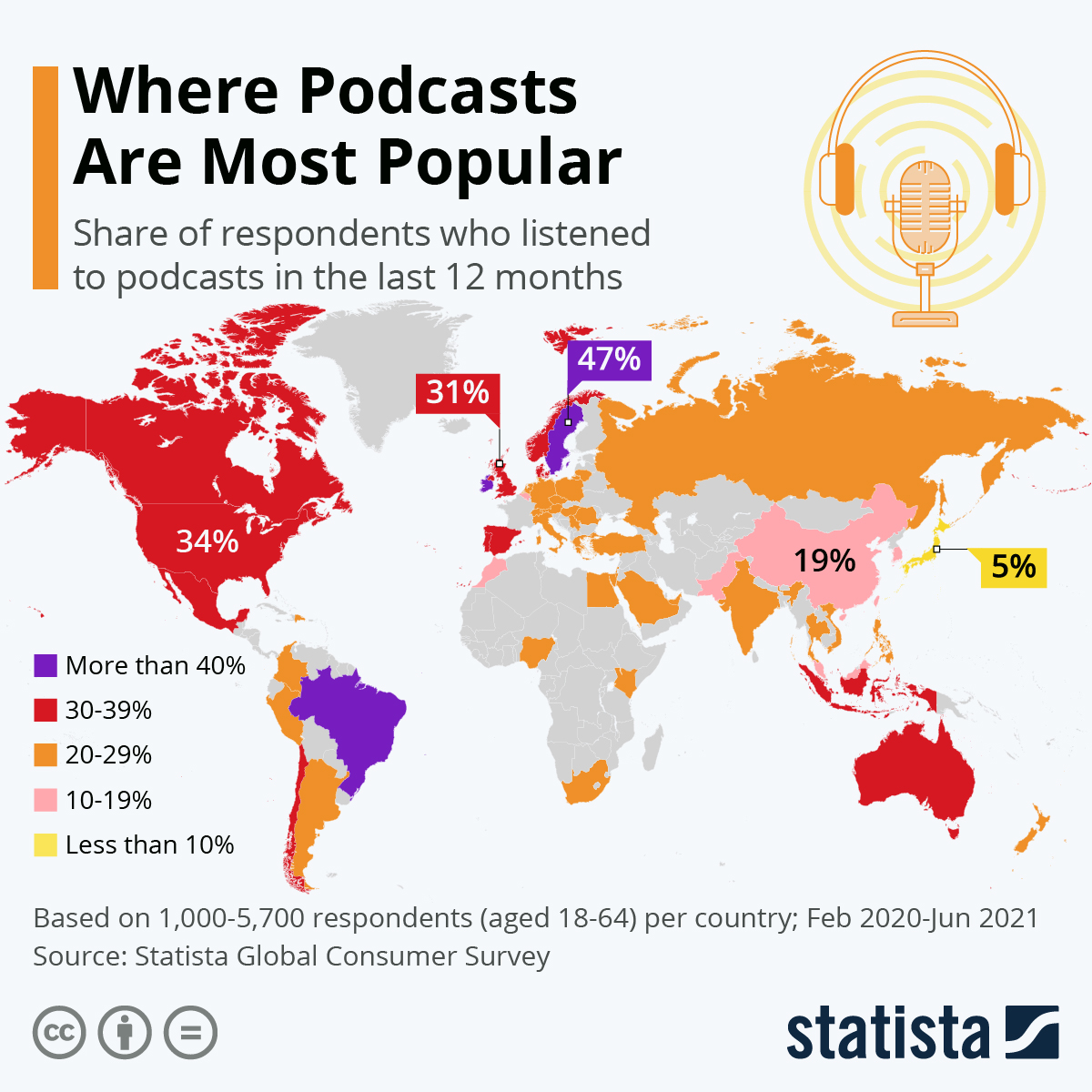SBI enters the world of podcasting
By Maryann Kelly
14 November 2023

Photo: Top Right, Dr. Pamela Evans, Prof. Owen Smith and Prof. Jonathan Bond.
Bottom Right, Prof. John Reynolds, Prof. Helen Roche. Credit: SBI
Over the course of SBI’s 14-year history, we have always looked for unique ways to increase our visibility to both the health and academic sectors as well as the wider public. For instance, we have a long-standing blog on the SBI website featuring interesting articles from across the centre. We have also produced short videos disseminating information and often coinciding with national awareness campaigns, such as World Cancer Day and Childhood Cancer Awareness Month. We have even taken part in charity fundraising challenges, such as the Irish Cancer Society’s “Daffodil Day” or LauraLynn Hospice Foundation’s 200k Steps in February, highlighting our progress on social media.
When looking at outreach and communications goals for 2023, we decided to try something new. The idea of an SBI podcast focusing on precision medicine came to mind, and with a bit of brainstorming and tinkering, “Precisely” was born.
“Precisely: A Precision Medicine Podcast from Systems Biology Ireland” aims to bring informal conversations with professionals in the precision medicine sphere in Ireland to a wide audience, including not only researchers and academics, but also clinicians, patients and the broader public. Each episode features an expert host from a given topic area, as well as one or two guest colleagues. The discussions cover the evolution of precision medicine and look specifically at the breakthroughs, challenges and future opportunities within each given field.
The first episode of the series was launched on September 14, 2023, with subsequent episodes releasing every two weeks afterwards. Our hope for the series is to offer six standalone episodes, but who knows? If we have the listenership to go beyond that, we will do our best to provide the content!
The episodes thus far are as follows:
Episode 1: The Origins with Prof. Walter Kolch & Prof. Frank Gannon
Episode 2: Precision Medicine in Paediatric Cancer with Prof. Jonathan Bond, Prof. Owen Smith and Dr. Pamela Evans
Episode 3: Precision Medicine in Gynaecological Oncology with Prof. Donal Brennan, Dr. Geraldine O’Sullivan Coyne and Dr. Ann Treacy
Episode 4: Precision Medicine in Health & Nutrition with Prof. Helen Roche and Prof. John Reynolds

The episodes to date have been well received, with the first episode appearing in the Top Ten Medicine Podcasts in Ireland on Apple podcasts during the early weeks of its launch. Though it is still early days, overall podcast plays/streams are 465 and we have 44 subscribers to date. More than half of our audience comes from outside Ireland, and more than 70 percent are under the age of 34 (see Figure 1). We have been lucky enough to enlist the help of Mike Liffey with Real Smart Media for the actual recording, editing and distribution of this podcast, which has been key to producing a coherent and professional show. Without Mike on board, it would be a far inferior product!
Even with the numbers listed above, you may still be asking, why a podcast? And for anyone who is not aware – don’t be embarrassed – what is a podcast?
Podcasts are like live talk radio shows, except that they are “broadcast” on a person’s smartphone or played over a computer from a web link. They mainly feature spoken audio in the form of interviews or monologues, and are typically organised into seasons or, as with “Precisely,” a limited series. You can subscribe to a podcast or simply listen to a single episode and the content can also be downloaded for listening offline. Most podcasts are free to listen to, but some may have ads to help offset the cost of creation and posting episodes to various distribution platforms such as iTunes, Spotify, SoundCloud, and so forth.
SBI chose to launch a podcast for a few reasons. First, this is a medium we have not tried before, and one that has grown in worldwide popularity, particularly in the years since the pandemic began [1]. Not only has podcasting grown in terms of new podcasts being generated and listener numbers, but it also appears to be a preferred medium among young adult audiences in particular [2]. Interestingly, Ireland has a high number of listeners compared to other countries, with as many as 46 percent of adults here listening to at least one podcast a month, according to a 2022 report from Reuters [3].
There are any number of reasons why podcasts and their listeners continue to grow. One reason that influenced us in the creation of “Precisely” was the way that podcasts have a unique capability of reaching audiences anywhere, at any time, with precisely the message you want to communicate (no pun intended), and with a more conversational and relaxed delivery than traditional news programmes or published features. Furthermore, when used as a method for scientific communication, a podcast is a relatively simple tool we can use to inform a wide audience of important research findings that actually apply to them. Not only does this help us communicate our work through public engagement, but it also offers the potential of helping build a greater public trust in science overall. [4,5,6]
If you have not yet had a chance to listen to “Precisely: a Precision Medicine Podcast from Systems Biology Ireland,” we hope this blog has at least piqued your interest enough to give it a go. If you have a favourite, we’d love to hear your feedback! Email us at (opens in a new window)sbiadmin@ucd.ie.
You can find all of our episodes here: https://www.ucd.ie/sbi/news/podcast/body,702716,en.html
(opens in a new window) You will find more infographics at (opens in a new window)Statista
You will find more infographics at (opens in a new window)Statista
References:
- Richter F. 2021 The Steady Rise of Podcasts. Statista. (opens in a new window)https://www.statista.com/chart/10713/podcast-listeners-in-the-united-states/
- Jurkowitz M et al. 2023 Podcasts as a Source of News and Information. Pew Research Center. (opens in a new window)https://www.pewresearch.org/journalism/2023/04/18/podcasts-as-a-source-of-news-and-information/
- Murrell C. 2022 Ireland – 2022 Digital News Report, Reuters Institute and University of Oxford. (opens in a new window)https://reutersinstitute.politics.ox.ac.uk/digital-news-report/2022/ireland
- MacKenzie LE. 2019 Science podcasts: analysis of global production and output from 2004 to 2018. Soc. Open sci. 6:180932. (opens in a new window)http://dx.doi.org/10.1098/rsos.180932
- Birch H, Weitkamp E. 2010 Podologues: conversations created by science podcasts. New Media Soc. 12, 889 – 909. (doi:10.1177/1461444809356333)
- Wynne B. 2006 Public engagement as a means of restoring public trust in science: hitting the notes but missing the music? Community Genet. 9, 211-220. (doi: 10.1159/000092659)